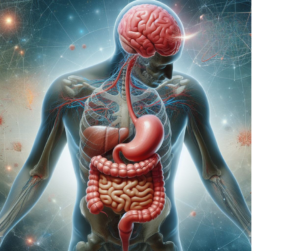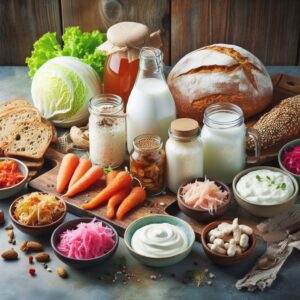There are a few stomach and gut health problems that can disrupt the digestive system, causing pain and discomfort and affecting quality of life. These include irritable bowel syndrome, gastroesophageal reflux disease, peptic ulcers, inflammatory bowel disease, coeliac disease, diverticulitis, and gallstones.
Table of Contents
ToggleIrritable bowel syndrome
Irritable bowel syndrome is a chronic condition that affects gut health by causing stomach pain, bloating, diarrhoea, constipation, or even both. What actually triggers irritable bowel syndrome can be down to genetics, diet, a previous infection, inflammation of the gut lining, leaky gut, and too many pathogenic bacteria in the gut.
Gastroesophageal reflux disease
Gastroesophageal reflux disease is another long-term condition where stomach acid comes back up into the oesophagus on a regular basis. This acid reflux causes heartburn, regurgitation, and chest pain. If left untreated, this can cause inflammation of the oesophagus, known as Barrett’s oesophagus, which can potentially lead to cancer of the oesophagus.
Gastroesophageal reflux disease is the result of the tight muscular junction between the stomach and oesophagus, known as a sphincter, becoming weak. This allows digestive acids to escape from the stomach and flow back into the oesophagus. Other causes are the stomach not emptying properly or a hiatus hernia, which can also weaken the sphincter in between the stomach and oesophagus.
Other reasons the sphincter can become weak are being overweight, smoking, eating citrus, spicy, or fatty foods, caffeinated and alcoholic drinks, and taking some medications, such as non-steroidal anti-inflammatory drugs.
Peptic ulcers
Peptic ulcers are sores, just like the ones that occur in the mouth, but they develop in the lining of the stomach, oesophagus, or small intestine. The symptoms of peptic ulcers are pain in the abdomen, bloating, nausea, vomiting, and weight loss. The main causes of peptic ulcers are too many pathogenic bacteria, especially Helicobacter pylori, which causes an infection, long-term use of nonsteroidal anti-inflammatory drugs, too much stomach acid, and damage to the layer of mucus that protects the lining of the digestive tract. Smoking and excessive alcohol intake can also cause these painful ulcers.
Inflammatory bowel disease
Inflammatory bowel disease is when the gut is inflamed on a long-term basis. This can be caused by Crohn’s disease or ulcerative colitis. The symptoms include pain in the abdomen, diarrhoea, unintentional weight loss, and fatigue. Unfortunately, this painful disease is linked to a family history of autoimmune conditions as well as inflammatory bowel disease. There is no cure, and there is also an increased risk of developing bowel cancer. Like irritable bowel syndrome, it can impact quality of life. Inflammation of the lining of the gut can decrease the protective layer of mucus and cause gaps to form between the single layer of cells that line the gut. This affects gut health by making the gut permeable, allowing toxins and bacteria to leak into the bloodstream, causing pain, infections, and further inflammation in the body.
Coeliac disease
Coeliac disease is a disease that is associated with a reaction to a specific protein that is present in wheat, called gluten. This protein is found in grains such as rye, wheat and barley. It damages the lining of the gut, which can reduce how efficiently nutrients are absorbed in the gut. Digestive issues caused by coeliac disease include smelly diarrhoea, bloating, flatulence, indigestion, and constipation, all of which can cause considerable abdominal pain.
An individual is more likely to develop celiac disease if other family members have it and if they already have other autoimmune diseases. Autoimmune diseases are those where the body attacks itself.
Diverticulitis
Diverticular disease is where small pockets develop along the large intestine. Bits of food get into these pockets, causing inflammation and infection which leads to the development of diverticulitis. The gut and stomach problems that this causes are feeling bloated and pain in the lower part of the stomach. If an individual develops more severe stomach pain, a high temperature, or chronic diarrhoea (or all three), it is important to see a doctor as soon as possible. The main causes are eating a diet that is low in fibre, especially a diet high in processed foods. Being overweight, not doing much physical activity, and smoking are other risk factors.
Gallstones
Although gallstones are not in the stomach or gut, they can cause intense pain in the upper abdomen. They develop from hardened cholesterol, bile, and bilirubin that form into small stones in the gallbladder. They can be as small as a grain of sugar or as large as a small ball – think golf ball or ping pong ball. They can also cause nausea and vomiting. Being over the age of 40, or female, increases the risk of developing gallstones, as does being overweight, having diabetes, or having a family history of gallstones. Eating a low-fibre, highly processed diet can also increase the risk of developing gallstones.
Preventing common gut and stomach problems

The digestive tract is often referred to as the “second brain” because it contains a complex network of nerves, known as the enteric nervous system. In fact, it contains more than the spinal cord and the nerves coming off the spinal cord, known as the peripheral nervous system. It also includes the vagus nerve, which is a long nerve that connects the gut to the brain. Strangely, there are more connections from the gut to the brain than from the brain to the gut. This is known as the gut-brain axis. The enteric nervous system can influence our emotions and moods, which is why we often get that ‘gut feeling’ about things.
The term “second brain” also underlines the significant role the gut, including the trillions of micro-organisms and bacteria in the gut, play in overall well-being, including mental health and immunity. Research is steadily emerging as the scientific community discovers more about the importance of the gut regarding diseases and digestive issues. It might surprise you to learn that there are more micro-organism cells in the microbiome than there are human cells in the whole body, and over one hundred times more genes in the microbiome than in the human genome. This goes a long way towards explaining why the microorganisms in the gut play such an important role in our immunity and protecting against gut and stomach problems.
The microorganisms in the gut also play an important part in digestion, synthesising vitamins such as vitamin K, biotin, and some B vitamins, boosting the immune system, and helping to maintain the delicate microbial balance, preventing pathogenic bacteria from taking hold and causing infections and digestive issues. Therefore, it is vital that the microbiome be healthy.
Research increasingly shows that many health conditions, from digestive disorders like irritable bowel syndrome to autoimmune diseases and even mental health conditions may be linked to imbalances in the gut microbiota or gut-related inflammation. For that reason, making gut health a priority goes a long way towards preventing stomach and gut problems.
Keeping the gut microbiome healthy
Supporting gut health through a well-balanced and gut-friendly diet is essential for preventing stomach and gut problems, as well as boosting the health, growth, and multiplication of beneficial bacteria, providing essential nutrients, and supporting digestion.
A diet that is high in fibre is one of the best ways to support the growth and multiplication of beneficial bacteria in the gut. This is because fibre, especially insoluble fibre, acts as a food source for beneficial bacteria. The beneficial bacteria are known as probiotics, and the insoluble fibres are known as prebiotics.
Prebiotic fibre is found in plant-based foods such as fruits, vegetables, whole grains, legumes, and nuts. This is the type of fibre that is not broken down by digestive enzymes in humans. This undigested fibre is then broken down by fermentation by the gut bacteria in the large intestine, or colon. This produces short-chain fatty acids that are used by the cells that line the large intestine for energy. Butyrate, one of the short-chain fatty acids that is produced, is particularly important for the prevention of gut problems and can even protect against the development of colorectal cancer. This is because butyrate has anti-inflammatory properties.
The best prebiotic foods to eat are cruciferous vegetables such as broccoli, asparagus, onions, garlic, cauliflower, cabbage, and sprouts. The best fruits are avocado pears, coconut, raspberries, and kiwi fruit. As a side note, it is possible to eat the skin of a kiwi fruit to increase fibre, but it has an acquired taste due to its scratchy texture. Probiotic bacteria also love the fibre in grains such as bulgar wheat, rye, and oats. Don’t forget beans and pulses, including lentils, chickpeas, kidney beans, black beans, and haricot beans.
The presence of SCFAs helps to create a favourable environment in the gut, promoting the growth of beneficial bacteria while inhibiting the growth of harmful microbes. This helps in maintaining a healthy gut microbiome, which is associated with improved digestion, strengthened immune function, and a reduced risk of various gastrointestinal disorders.

Eat fermented foods
Another way to keep the gut bacteria happy, healthy, and merrily multiplying is to eat fermented foods. These include kimchi and sauerkraut. These foods contain not only live probiotic bacteria but also prebiotic food for the bacteria in the form of vegetables. Both kimchi and sauerkraut are fermented cabbage, although kimchi tends to have the addition of spices such as chilli and ginger. It can also include radish and carrot, all of which can make it more pleasant to eat. Both kimchi and sauerkraut can be used as pickles with cheese or served with salad.
Other fermented foods and drinks include yoghurt, water or milk kefir, kombucha, tempeh, and miso. These fermented foods not only boost the number of probiotics in the gut but also support the production of vitamins in the gut.
Eating a wide variety of fermented foods can also benefit the microbiome by introducing more varieties or species of beneficial bacteria. This is important, as they all have different benefits for gut health. Fermented milk products such as yoghurt and kefir can increase short-chain fatty acids and have been shown to help reduce the symptoms of irritable bowel syndrome and inflammatory bowel disease. Sauerkraut has also been shown to improve the beneficial bacteria in the gut of those suffering from irritable bowel syndrome, which helped to reduce their symptoms significantly.
Likewise, probiotic yoghurt can help restore the balance of beneficial bacteria when there is an overgrowth of the pathogenic bacteria Heliobacter pylori. Fermented soy milk and kombucha, a fermented green tea, can both help to reduce the number of pathogenic bacteria caused by food poisoning. Therefore, eating these fermented foods can protect against gut and stomach problems or help to ease those that are already established.

High-fibre diet for healthy digestion
Having a high-fibre diet is not only beneficial for the bacteria in the gut but can also help keep the digestive system moving, known as gut motility, and prevent constipation. Insoluble fibre, that humans cannot digest, adds bulk to the faeces and insoluble fibre absorbs water. These factors help the faeces work with the contractions in the gut, known as peristalsis, to push them along the digestive tract and be excreted.
Fibre also helps to reduce the amount of time that food takes to go through the digestive system, helping to prevent gut and stomach problems. Having a high-fibre diet helps to reduce the risk of diverticulitis, irritable bowel syndrome, and bowel cancer.
Drink plenty of water

Water plays a critical role in the digestive process and is essential for efficient digestion, helping to prevent gut and stomach problems. Firstly, water moistens food as it is chewed, making it easier to swallow. It then helps to lubricate the digestive tract, allowing food to move smoothly through the digestive tract. Water is a necessary component of digestive juices that break down food, including saliva, gastric juices, pancreatic enzymes, and bile, helping them to work effectively. For example, saliva is 99% water.
As food is broken down and digested into its component molecules, water helps the water-soluble nutrients be transported through the wall of the intestine into the bloodstream. It also helps to form the protective layer of mucus that protects the walls of the gut.
Water is necessary to flush the intestine and gut, helping with the removal of waste, toxins, and byproducts of digestion through urine and faeces. Drinking plenty of water also helps to prevent diverticulitis by washing away tiny bits of food that can get trapped in little pockets in the wall of the gut. It also helps prevent constipation and promotes regular emptying of the bowel.
To drink enough water to stay hydrated and support efficient digestion, it is advisable to drink approximately 8 cups of water a day. To prompt this, having a water bottle with calibrated markings on the side can help an individual drink enough throughout the day. If it is convenient, setting an hourly alarm can also be helpful.
Having a glass of water by your bedside is helpful, as when you wake up you are dehydrated, and drinking a whole glass of water before you even leave the bedroom is an easy win. Another tip to help you drink more is to have a glass of water with meals and to eat foods that have a high-water content. These foods include watermelon, watercress, cucumbers, oranges, tomatoes, and berries. If you don’t like plain water, herbal or fruit teas can help with hydration. To check that you are drinking enough water, the urine should be clear or very pale yellow in colour. This is especially important during hot weather, when drinking alcohol, and during and after strenuous exercise.
Foods that can cause gut and stomach problems
Avoiding certain foods that can irritate or negatively impact the gut and stomach is crucial for maintaining a healthy digestive system. These foods may make the symptoms of individuals with digestive conditions worse or upset the delicate balance of the gut microbiome.
Processed foods
Highly processed foods are often lacking in fibre but also tend to contain additives, preservatives, emulsifiers, and artificial flavourings, all of which can disrupt the gut bacteria and cause inflammation. Processed foods that can cause gut and stomach problems if eaten on a regular basis include foods that have a long shelf life and include food products produced on a large scale, including carbonated drinks, confectionery, margarine, biscuits, pastries, cakes, breakfast cereals, pizza, ready meals, sausages, burgers, nuggets, and so-called instant noodles or soups.
Many processed foods and drinks are high in sugar. These foods are particularly damaging to gut bacteria, as sugar feeds pathogenic bacteria, allowing them to multiply and cause infections that can lead to gut and stomach problems such as vomiting and diarrhoea. This reduction in beneficial bacteria also reduces the production of short-chain fatty acids. On top of that, eating a lot of sugary foods can cause inflammation in the gut, which can affect the integrity of the gut lining, leading to a leaky gut. A diet high in sugar has also been linked to the development of inflammatory bowel disease and colitis.
Processed foods, confectionery, and so-called ‘diet’ food products often contain artificial sweeteners. Like sugar, some of these can also have a negative effect on the beneficial gut bacteria. However, in the interest of fairness, it is worth pointing out that xylitol, a common granular sugar substitute, can increase the number of gut bacteria.
Fried foods and foods high in fat
Like sugar, a diet high in fat, especially saturated fat, can also cause inflammation in the gut and lead to leaky gut. High-fat and fried foods, plus trans fats that are present in processed foods, can affect the number and diversity of beneficial bacteria in the gut.
Fried foods such as fries, burgers, and nuggets, as well as high-fat foods such as red meat, processed meats, pastries, cakes, and biscuits, can also cause indigestion. This is because fat takes a long time to break down and be digested, so it can hamper the contents of the stomach from moving through the digestive system. On top of that, cholecystokinin, a hormone that causes the sphincter that joins the oesophagus to the stomach to relax, enables acid in the stomach to come back up the oesophagus, leading to acid reflux and heartburn.
Spicy foods
Spices and spicy foods can irritate the gut and stomach and worsen symptoms in individuals with conditions like acid reflux or irritable bowel syndrome. They can irritate peptic ulcers, although they do not cause them.
Alcohol
Drinking too much alcohol too often can irritate the gut lining and cause inflammation, which can lead to gastritis. The symptoms of gastritis are heartburn, nausea, vomiting, and stomach pain. It can also affect how fast or slowly the stomach empties depending on how strong it is, with stronger alcohol slowing gastric motility down and low alcohol speeding it up. This can lead to indigestion. Finally, drinking an excessive amount of alcohol can lead to the ultimate stomach problem, cancer.
High-lectin foods
Lectins are sometimes referred to as anti-nutrients, as are phytates. Foods that contain these anti-nutrients include beans, nuts, lentils, legumes, and whole grains such as wheat. Lectins are present in these foods as nature’s way of defending themselves against being eaten. They are difficult to digest because the lectins hold on to the nutrients, preventing their absorption. Consequently, they can cause bloating, nausea, vomiting, diarrhoea, and indigestion. However, by cooking, sprouting, or soaking these foods, this effect is reduced, which is good news as the benefits of eating these foods outweigh the negatives.
Preventing gut and stomach problems can be as difficult or hard as an individual makes it. Eating a healthy diet, free from processed foods, drinking plenty of fresh water, and avoiding foods that cause digestive issues are essential to keeping the digestive system working efficiently and healthy. However, if digestive issues are experienced for more than a few days, it is important to speak to a health professional to check that the underlying cause is not a digestive disease, when, unfortunately, medical intervention may then be necessary.
Gut health plays a vital part in weight managment. Find out more about my 8 week course weight management course here.
References
Think Twice: How the Gut’s “Second Brain” Influences Mood and Well-Being
Nutrition meets the microbiome: micronutrients and the microbiota
8 Fermented Foods and Drinks to Boost Digestion and Health
19 Water-Rich Foods That Help You Stay Hydrated
Effects of Sweeteners on the Gut Microbiota: A Review of Experimental Studies and Clinical Trials
The Article: How to Prevent & Treat Stomach and Gut health Problems Appeared First On Jane Stevens Nutrition.


Your exploration of stomach and gut health problems touches on an incredibly important topic that affects so many individuals’ day-to-day lives. The prevalence of conditions like irritable bowel syndrome (IBS) and gastroesophageal reflux disease (GERD) goes beyond the physical symptoms; these disorders often come with profound emotional and psychological implications that can significantly affect a person’s quality of life.
Your exploration of stomach and gut health problems offers a crucial look into how these conditions can deeply impact one’s quality of life. I find it particularly interesting how conditions like irritable bowel syndrome (IBS) often intersect with lifestyle factors, including diet and stress. For instance, I’ve noticed that dietary choices, especially the inclusion of high-FODMAP foods, can significantly influence IBS symptoms for many individuals.
It’s true—diet and stress do play such a huge part in managing IBS. It’s fascinating how something as simple as choosing one food over another can change how someone feels day to day. High-FODMAP foods can be tricky. For some, they seem harmless, while for others, they can unleash a wave of discomfort.